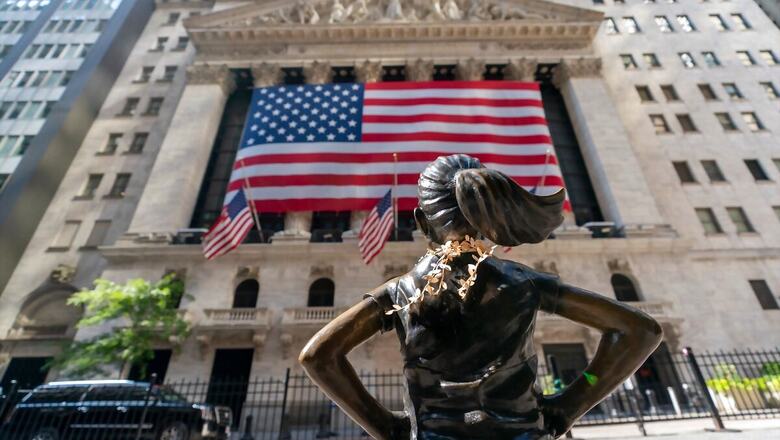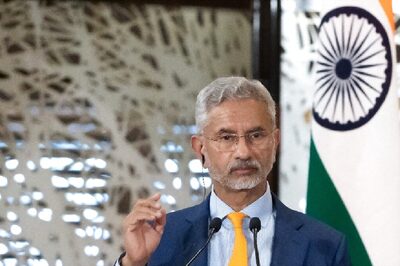
views
NEW YORK: Stocks are slipping Friday, as Wall Streets first reaction to President Donald Trumps testing positive for the coronavirus was to retrench, but hopes for coming aid for the economy from Congress are helping to limit the losses.
The S&P 500 was down 0.5% in afternoon trading, paring its earlier losses. It fell as much as 1.7% shortly after trading began. But the moves werent close to as chaotic as earlier this year, when markets were first selling off on coronavirus fears.
The Dow Jones Industrial Average was down 112 points, or 0.4%, at 27,707, as of 12:48 p.m. Eastern time, after earlier being down 433 points. The Nasdaq composite was 1.1% lower.
To say this potentially could be a big deal is an understatement, Rabobank said in a commentary. Anyway, everything now takes a backseat to the latest incredible twist in this US election campaign.
Analysts said some of the markets movements could be explained by investors building up expectations for a Joe Biden victory of the White House, with Election Day a little more than a month away. That could mean higher tax rates and tighter regulations on companies, which would limit profits and hurt stock prices.
But analysts said a Democratic election sweep could also improve the odds for a big rescue package for the economy, one that investors call crucial and one that has been stymied so far by partisanship in Washington. That would provide a boost to markets.
Also stirring up the markets movements Friday was the latest report on U.S. jobs growth, which is usually the headline economic data of each month. Employers added fewer jobs last month than economists expected, the third straight month of slowing hiring.
The slowdown is yet another sign that the recovery is trailing off, said Mike Zigmont, director of trading and research at Harvest Volatility Management. The numbers don’t inspire bullishness, but they could be a brighter signal for more help from Congress.
If the conclusion is that the economic data disappoints, Wall Street may say thats added incentive for the next stimulus deal to eventually go through and more quickly, he said.
Other reports on the economy were more mixed. Consumer sentiment was stronger for September than economists expected, which is key because their spending drives the bulk of the economy. Orders for machinery and other long-lasting goods also strengthened by more than expected in August, but growth in factory orders fell short of forecasts.
All the uncertainty is making an already shaky market even more so. Stocks have swung through turbulent trading recently amid a raft of open questions for investors: Who will win the election, and what will it mean for the economy? Will the relationship between the worlds two largest economies, the United States and China, keep worsening? Did stocks get too expensive after their 60% surge to record heights through the summer?
In recent days, the dominant question has been whether Washington will be able to get past its partisanship to deliver more aid to the economy.
Extra benefits for laid-off workers and other support for the economy that Congress approved in March has expired, and investors have been clamoring for more assistance. Layoffs have remained stubbornly high across the country, and parts of the economy have slowed with the support from Congress gone.
The House of Representatives passed a Democratic $2.2 trillion package Thursday night, but it has little chance of getting through the Republican Senate. Talks between Democrats and Republicans on a compromise are continuing, but skepticism is high.
Tens of thousands of airline workers could lose their jobs this month as federal aid to the airlines expires. The issue prompted a statement from House Speaker Nancy Pelosi, asking airlines to hold off on furloughs and firings as Congress works on a relief package.
Major airlines shook off their losses for the day and reversed course following the statement. American Airlines rose 3.2%, United Airlines gained 2.7% and Delta Air Lines rose 2.6%.
Trumps positive COVID-19 test also highlights the continued spread of the pandemic. The White House physician said the president is expected to continue carrying out his duties without disruption while recovering.
But the potential for a further ramp up in infections as the weather turns colder is raising worries that governments may put some more restrictions on businesses.
The Walt Disney Co. already announced earlier this week that it would lay off 28,000 workers, largely because of restrictions at its theme parks due to the coronavirus.
The yield on the 10-year Treasury rose to 0.70% from 0.68% late Thursday, after pulling back from an earlier loss.
In Europe, stocks also trimmed their losses as the day progressed. Germanys DAX lost 0.3%, and Frances CAC 40 rose less than 0.1%. The FTSE 100 in London edged up 0.4%.
Trading in Asia was thin, with markets in Shanghai and Hong Kong closed. The Nikkei 225 index shed strong early gains to lose 0.7% after the Tokyo Stock Exchange resumed trading following an all-day outage due to a technical failure.
Reports that the Japanese government is preparing new stimulus measures to help the economy recover from a prolonged downturn worsened by the coronavirus pandemic provided only a temporary lift. Prices fell further after Trumps announcement.
___
AP Business Writer Elaine Kurtenbach contributed.
Disclaimer: This post has been auto-published from an agency feed without any modifications to the text and has not been reviewed by an editor



















Comments
0 comment